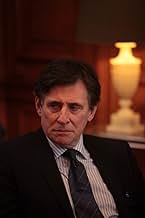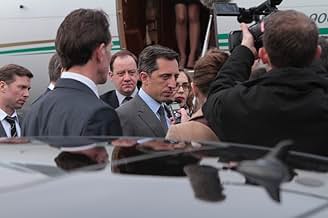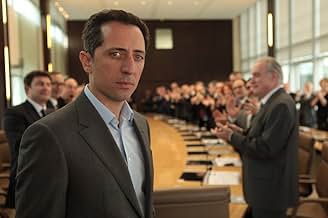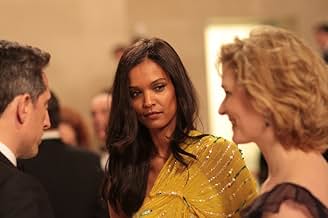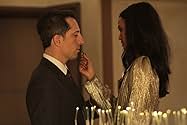IMDb RATING
6.5/10
5.7K
YOUR RATING
The newly appointed CEO of a giant European investment bank works to hold on to his power when an American hedge fund company tries to buy out his company.The newly appointed CEO of a giant European investment bank works to hold on to his power when an American hedge fund company tries to buy out his company.The newly appointed CEO of a giant European investment bank works to hold on to his power when an American hedge fund company tries to buy out his company.
- Awards
- 1 win & 2 nominations total
Featured reviews
It's interesting that Costa-Gavras chose to make a personal diatribe against finance through his "Capital" since he's most renowned for his politically-oriented themes that contributed to such memorable movies as "Z" or "Missing". I say 'interesting' because "The Capital" reminded me of another finance-themed film from another political director: Oliver Stone's "Wall Street", THE movie that summed up the inner amorality of finance through the iconic : 'Greed, for a lack of better word, is good'
I wasn't surprised that the political director made his cinematic "J'accuse" against finance, since it proved to be true ruler of our liberal world, whose only alibi for existence is to pretend there's no better alternative. After the economical crisis, the Goldman Sachs and Bernard Madoff' cases, after the French President claimed to have made finance his enemy, finance was definitely political matter, and if Costa-Gavras makes a film about it, it's certainly worth our attention. The question is: what would the film show that "Wall Street" didn't? (and this comes from someone who didn't even watched its sequel, "The Wolf of Wall Street" or "Margin Call", not yet)
I expected the most overused clichés from "The Capital", the young ambitious yuppie (Gad El Maleh) riding a fast ascension, his discovery of a world of corruption, lust and greed, ethical dilemmas, probable redemption etc. And the casting of Gad El Maleh didn't comfort my thoughts. Gad (as he's generally called) is one of the most popular comedians in France, but his transition from stage to cinema didn't bring much positive results. His "Chouchou" and "Coco", both cinematic adaptations of popular sketches were critically panned, much more; Gad never really struck as a serious comedian, and was never considered an equal to Jean Dujardin or Vincent Cassel, to give you an idea.
Then I looked at the trailer and was already cringing at his crisped face, he was obviously trying to inhabit the gravity of the subject by playing the tough-guy, and if it doesn't work for Di Caprio, it's even worse for him. The trailer gave away the most archetypal situations, the corrupt bankers, the cynical American, the sexy top-model, the fast-paced editing and the obligatory round trips between Paris, New York, London and Tokyo. I really didn't expect much, and watching the film was almost accidental. The film was a commercial bomb, and even Gad's popularity didn't help, or were people tired of the subject? I guess I wanted to see where I would stand for, and my expectations were so low they could only be positively contradicted.
The first good point relies on the straight-forward narrative, Marc Tourneuil (Gad El Maleh) is not the Boy Scout that would make a perfect puppet for his hierarchy: he understands the malevolent schemes behind his nomination as a CEO of Phenix bank, replacing the former, cancerous President. He knows he has the opportunity of a lifetime to win money and be the master of his own actions. That's a first deviation from the usual 'selling-soul-to-the-devil' plot and it was quite refreshing to see a character who already embraced the cynicism of his environment. The film turns immediately into a chess game involving Tourneuil, the board members, the head of an American hedge fund (Gabriel Byrne), and in a zero-sum game, we expect only one winner.
Indeed, it doesn't take a MBA degree to understand the plot, complex but not contrived. In a nutshell, it's all about finding the tricks to distract the French government from a plan of mass-layoffs in order to increase Phenix' profitability, there are many cases of insider trading, of political maneuvers, fiscal exits and such expectable lines as 'money never sleeps'. The film tries to cover every aspect of finance, succeeding by not making it feel too forced or cliché. However, this owes more to the story than the acting or the script. Gad delivers a fine performance but there are moments where his character didn't exactly know what to do, and I suspect it was the actor lacking the right direction. Gad proved to be an actor of fair capabilities and his performance alternates between some powerful outbursts to awkward lines' deliveries where he's never totally Gordon Gekko, and can't convince as a Buddy Fox.
It's regrettable because Costa-Gavras had the material for a good film, not the most subtle one, but for a gripping thriller and fair entertainment. Yet he polluted it with some unnecessary subplots such as a dull romance with a top model. The film skates over the difficult compatibility between Marc's job and his private life, there are some moments with his wife and his family that could have been fueled with more energy and self-questioning, after all, wouldn't we be interested to see a businessman with a family, for once he's not the lone wolf, young and single. Marc's wife could have added more to the story, allowing her to deviate from "Wall Street" formula but she was too underdeveloped and it's only between Gad and Byrne that the script revealed its few strengths.
Now, I'm more perplexed regarding the fourth-wall breaking moments. It might be a promising concept on the paper to have the protagonist address us, making us wondering if he's really enjoying or disdaining the game he's playing. I think it's up to the actor to make the thing believable or out-of-place, it worked at the ending of "Goodfellas" because Ray Liotta had that liveliness in his eyes, the intensity in the narration that immediately grabbed our attention. Gad talks in a too much laconic voice and really seems like reading lines without believing in them. Anyway, I expected more flamboyance from a modern Robin Hood.
These technical aspects highlight the flaws in the script, that mixed up the words 'insightful' and 'preachy', whether it's to tell us that finance is bad or necessary (or both), we simply wonder if there is something the film shows we didn't already know.
I wasn't surprised that the political director made his cinematic "J'accuse" against finance, since it proved to be true ruler of our liberal world, whose only alibi for existence is to pretend there's no better alternative. After the economical crisis, the Goldman Sachs and Bernard Madoff' cases, after the French President claimed to have made finance his enemy, finance was definitely political matter, and if Costa-Gavras makes a film about it, it's certainly worth our attention. The question is: what would the film show that "Wall Street" didn't? (and this comes from someone who didn't even watched its sequel, "The Wolf of Wall Street" or "Margin Call", not yet)
I expected the most overused clichés from "The Capital", the young ambitious yuppie (Gad El Maleh) riding a fast ascension, his discovery of a world of corruption, lust and greed, ethical dilemmas, probable redemption etc. And the casting of Gad El Maleh didn't comfort my thoughts. Gad (as he's generally called) is one of the most popular comedians in France, but his transition from stage to cinema didn't bring much positive results. His "Chouchou" and "Coco", both cinematic adaptations of popular sketches were critically panned, much more; Gad never really struck as a serious comedian, and was never considered an equal to Jean Dujardin or Vincent Cassel, to give you an idea.
Then I looked at the trailer and was already cringing at his crisped face, he was obviously trying to inhabit the gravity of the subject by playing the tough-guy, and if it doesn't work for Di Caprio, it's even worse for him. The trailer gave away the most archetypal situations, the corrupt bankers, the cynical American, the sexy top-model, the fast-paced editing and the obligatory round trips between Paris, New York, London and Tokyo. I really didn't expect much, and watching the film was almost accidental. The film was a commercial bomb, and even Gad's popularity didn't help, or were people tired of the subject? I guess I wanted to see where I would stand for, and my expectations were so low they could only be positively contradicted.
The first good point relies on the straight-forward narrative, Marc Tourneuil (Gad El Maleh) is not the Boy Scout that would make a perfect puppet for his hierarchy: he understands the malevolent schemes behind his nomination as a CEO of Phenix bank, replacing the former, cancerous President. He knows he has the opportunity of a lifetime to win money and be the master of his own actions. That's a first deviation from the usual 'selling-soul-to-the-devil' plot and it was quite refreshing to see a character who already embraced the cynicism of his environment. The film turns immediately into a chess game involving Tourneuil, the board members, the head of an American hedge fund (Gabriel Byrne), and in a zero-sum game, we expect only one winner.
Indeed, it doesn't take a MBA degree to understand the plot, complex but not contrived. In a nutshell, it's all about finding the tricks to distract the French government from a plan of mass-layoffs in order to increase Phenix' profitability, there are many cases of insider trading, of political maneuvers, fiscal exits and such expectable lines as 'money never sleeps'. The film tries to cover every aspect of finance, succeeding by not making it feel too forced or cliché. However, this owes more to the story than the acting or the script. Gad delivers a fine performance but there are moments where his character didn't exactly know what to do, and I suspect it was the actor lacking the right direction. Gad proved to be an actor of fair capabilities and his performance alternates between some powerful outbursts to awkward lines' deliveries where he's never totally Gordon Gekko, and can't convince as a Buddy Fox.
It's regrettable because Costa-Gavras had the material for a good film, not the most subtle one, but for a gripping thriller and fair entertainment. Yet he polluted it with some unnecessary subplots such as a dull romance with a top model. The film skates over the difficult compatibility between Marc's job and his private life, there are some moments with his wife and his family that could have been fueled with more energy and self-questioning, after all, wouldn't we be interested to see a businessman with a family, for once he's not the lone wolf, young and single. Marc's wife could have added more to the story, allowing her to deviate from "Wall Street" formula but she was too underdeveloped and it's only between Gad and Byrne that the script revealed its few strengths.
Now, I'm more perplexed regarding the fourth-wall breaking moments. It might be a promising concept on the paper to have the protagonist address us, making us wondering if he's really enjoying or disdaining the game he's playing. I think it's up to the actor to make the thing believable or out-of-place, it worked at the ending of "Goodfellas" because Ray Liotta had that liveliness in his eyes, the intensity in the narration that immediately grabbed our attention. Gad talks in a too much laconic voice and really seems like reading lines without believing in them. Anyway, I expected more flamboyance from a modern Robin Hood.
These technical aspects highlight the flaws in the script, that mixed up the words 'insightful' and 'preachy', whether it's to tell us that finance is bad or necessary (or both), we simply wonder if there is something the film shows we didn't already know.
Le Capital follows the course of a newly-appointed CEO of a hypothetical major French bank with global reach. The protagonist is a smart, ambitious and hard-nosed executive, but the constant pressures he faces at the helm of Phenix Bank from his board, which didn't favor his taking command but feel they can control him, from his employees who are unclear as to the direction in which he wants to take Phenix Bank compared to his cancer-stricken predecessor, and most keenly from his shareholders, particularly a U.S.-located hedge fund, almost want to make you sympathize with him. But his ruthless, hard character and the cold but correct way he treats his family ultimately prevents this identification. (I've read that the actor portraying the CEO is a comedian on French television so this must be quite a switch for him.)
The heart of the film is the pressure that the American hedge fund, as represented by a character who would put Gordon Ghecko to shame, places on the CEO to initiate drastic actions to pump the stock price. Apparently, the hedge fund has acquired a dominant position in Phenix's stock that enables it to virtually dictate policy to the bank, or at least to this CEO. Of course the dictation is smoothed by the fact that he's promised huge bonuses to implement these "suggestions". The initial directive is to fire 10,000 of the bank's employees which he does gratified by the promised bonus and seemingly unconcerned by the fact that "his" bank does not appear to have an excess labor force. The final "directive" is for Phenix Bank to make an acquisition of a troubled Japanese bank with poor assets. At last some resistance begins to form in our CEO because he senses he'll be the "fall guy" for such an ill-advised acquisition and that the adverse impact of such an acquisition on Phenix's stock price would apparently enable the hedge fund to acquire complete control of the bank at a cheaper price. (One could nitpick and say that the filmmakers in their anti-capitalist bias are confusing corporate raiders who do hostile takeovers with hedge funds who are content to be "activist" investors and prod the company's management and not manage the company. Moreover, why would the hedge fund want to manage the troubled assets of the Japanese bank as part of the larger Phenix Bank, particularly if they were acquired with cash most likely burdening Phenix Bank with much increased debt? A stock-for-stock exchange might affect the target bank's shareholders with a lower value for their stock.) What the CEO ultimately does about the Japanese bank and his erstwhile hedge fund friends I'll leave for those who choose to view this film. I, for one, enjoyed it. I found the banking scenes to be interesting and the characterizations to be provocative although in some cases over the top. For non-French speakers like this English speaker, I think you'll need to go back a bit a number of times on a DVD to refresh the sub-titles in order to follow the financial ramifications of the plot.
The filmmakers' attitude toward high-finance capitalism is most apparent in an amusing but over-the-top scene where our banking CEO says in an opulent boardroom among well-dressed board members that our new paradigm is to "rob from the poor and give to the rich" to which he's met with enthusiastic applause. I'm sure the vast majority of bankers don't believe this or follow this goal explicitly; however, their actions may sometimes indeed perform this transfer of wealth, e.g., the LIBOR interest rate manipulation which served to enrich banks and their usually wealthy shareholders (but also including 401k holders) but increased the cost to homeowners with variable-rate mortgages. I would guess the basic question underlying films like "Capital" is whether economic systems like capitalism promote the kind of greed and exploitation we see in "Capital" or whether greed-filled and exploitative people perform their misery in any kind of system (for you socialists out there, socialism did not really end greed and exploitation; it was just manifested in another form, the form of political power and perks). Perhaps the filmmakers' message is that financial capitalism allows monetary greed to be more fully realized.
The heart of the film is the pressure that the American hedge fund, as represented by a character who would put Gordon Ghecko to shame, places on the CEO to initiate drastic actions to pump the stock price. Apparently, the hedge fund has acquired a dominant position in Phenix's stock that enables it to virtually dictate policy to the bank, or at least to this CEO. Of course the dictation is smoothed by the fact that he's promised huge bonuses to implement these "suggestions". The initial directive is to fire 10,000 of the bank's employees which he does gratified by the promised bonus and seemingly unconcerned by the fact that "his" bank does not appear to have an excess labor force. The final "directive" is for Phenix Bank to make an acquisition of a troubled Japanese bank with poor assets. At last some resistance begins to form in our CEO because he senses he'll be the "fall guy" for such an ill-advised acquisition and that the adverse impact of such an acquisition on Phenix's stock price would apparently enable the hedge fund to acquire complete control of the bank at a cheaper price. (One could nitpick and say that the filmmakers in their anti-capitalist bias are confusing corporate raiders who do hostile takeovers with hedge funds who are content to be "activist" investors and prod the company's management and not manage the company. Moreover, why would the hedge fund want to manage the troubled assets of the Japanese bank as part of the larger Phenix Bank, particularly if they were acquired with cash most likely burdening Phenix Bank with much increased debt? A stock-for-stock exchange might affect the target bank's shareholders with a lower value for their stock.) What the CEO ultimately does about the Japanese bank and his erstwhile hedge fund friends I'll leave for those who choose to view this film. I, for one, enjoyed it. I found the banking scenes to be interesting and the characterizations to be provocative although in some cases over the top. For non-French speakers like this English speaker, I think you'll need to go back a bit a number of times on a DVD to refresh the sub-titles in order to follow the financial ramifications of the plot.
The filmmakers' attitude toward high-finance capitalism is most apparent in an amusing but over-the-top scene where our banking CEO says in an opulent boardroom among well-dressed board members that our new paradigm is to "rob from the poor and give to the rich" to which he's met with enthusiastic applause. I'm sure the vast majority of bankers don't believe this or follow this goal explicitly; however, their actions may sometimes indeed perform this transfer of wealth, e.g., the LIBOR interest rate manipulation which served to enrich banks and their usually wealthy shareholders (but also including 401k holders) but increased the cost to homeowners with variable-rate mortgages. I would guess the basic question underlying films like "Capital" is whether economic systems like capitalism promote the kind of greed and exploitation we see in "Capital" or whether greed-filled and exploitative people perform their misery in any kind of system (for you socialists out there, socialism did not really end greed and exploitation; it was just manifested in another form, the form of political power and perks). Perhaps the filmmakers' message is that financial capitalism allows monetary greed to be more fully realized.
I have seen the posters. Gad Elmaleh and Costa Gavras? Well, Costa Gavras directed nobodies like Ion Caramitru, so why not a stand up comedy man? Than I have read the reviews. The world is not like that, they say.
I have watched the movie. Maybe there are a bit too many characters on screen. I can say that of all of Costa Gavras' movies I have seen so far. But the story is good. And it's the best business-themed movie I have seen.
So what I can tell you is go see the movie and find for yourself if you like it. Just keep in mind this is not a reality TV show about white collar crime. Maybe it's true that the television has a strong impact on the way audiences perceive the big screen stories.
Contact me with Questions, Comments or Suggestions ryitfork @ bitmail.ch
I have watched the movie. Maybe there are a bit too many characters on screen. I can say that of all of Costa Gavras' movies I have seen so far. But the story is good. And it's the best business-themed movie I have seen.
So what I can tell you is go see the movie and find for yourself if you like it. Just keep in mind this is not a reality TV show about white collar crime. Maybe it's true that the television has a strong impact on the way audiences perceive the big screen stories.
Contact me with Questions, Comments or Suggestions ryitfork @ bitmail.ch
LE CAPITAL, (French) director Costa-Gavras, starring Gad Elmaleh, with Gabriel Byrne. Viewed at the 2013 Los Angeles Film Festival. Costa-Gavras' "Le Capital" is extremely glossy (in the good sense of the word) and an extremely penetrating high-end study of the workings of international Banking Conglomerates, in short, another typical Costa-Gavras exposé of the evils around us that run our lives without our realizing it.
At the beginning of the film the powerful head of a gigantic French investment bank, Le Phenix, collapses on a golf course and is diagnosed with terminal cancer "of the balls" (says the subtitle) --i.e., the testicles. With the implication that financial power mongers have to trade in sexual potency for financial power we have the first hint of the implicit satire to come.
The moribund CEO, passing over old cronies and more obvious candidates for the post he is about to vacate, hand picks a company nobody, a young scholarly banker, Marc Tourneuil, to the position of president thinking he will be easily manipulated during a temporary transition period.
Marc, played forcefully by handsome Moroccan born actor Gad Elmaleh, (Casablanca, 1971) turns out to be nobody's patsy, starts firing people right and left, and is soon running the bank for his own personal gain with the old timers plotting fecklessly against him. He gets involved in a multinational hostile takeover scheme masterminded remotely over office television by a sinister smooth talking Englishman (Gabriel Byrne). On the way in a complex effort to destroy him he is set up with a slinky black supermodel (apparently modeled on obstreperous English supermodel Naomi Campbell) who gives him a hard time in London and Tokyo before he finally has to rape her in a stretch limo in New York to gratify his methodically frustrated lust.
At the very end he finesses all the insiders trying to double cross him by threatening to expose the whole deal which will send them all to jail for insider trading. The deal in question has forced the collapse of Phenix and the creation of a new successor entity. At the foundation board meeting where Tourneuil is of course named the new CEO he announces that as their own "Robin du Bois" (Robin Hood) he will continue to rob the poor so that they can get even richer. Wild cheering goes up all around the table as actor Elmaleh turns to the camera and tells us in the audience directly that this will keep going on as long as we let it go on. Perhaps not the most subtle way to end this awesome tale of financial exploitation and greed at the highest levels, but maybe subtlety is not enough to wake us up.
The real meat of the film is the brilliant way in which Gavras presents the life styles of the super-greedy rich both in the work place and in their social life. For one party scene he apparently rented the entire sculpture foyer of the Louvre, as realistically lavish a party as has ever been seen on screen. All the other scenes follow suite in this typically excellent Costa Gavras mise-en-scene, a visual pleasure all the way and a heady thriller to boot.
"Le Capital" was not a big hit in France when released in November and was met with mixed reviews on IMDb and elsewhere, but since Americans do not have the same expectations as the French "Le capital" may enjoy a better reception here than it had on home ground. Gad Elamleh, for example, is far better known in France as a stand up comedian than a movie actor and his interpretation of banker Marc Tourneuil has been called unrealistic, but to an American audience that has never seen him before he will come across as quite convincing -- a handsome cad you end up rooting for because the other people he is up against are so much more evil and disgusting than he is. If anybody out there thinks that Costa Gavras has "lost it" at age eighty (as some have said) I would say they have another thought coming. In any case, having Consantine Costa Gavras visit the City of Angels to present his latest film was a singular feather in the hat of Film Independent.
"Le Capital" will go on general release in this country in October and then we shall see what people here have to say.
At the beginning of the film the powerful head of a gigantic French investment bank, Le Phenix, collapses on a golf course and is diagnosed with terminal cancer "of the balls" (says the subtitle) --i.e., the testicles. With the implication that financial power mongers have to trade in sexual potency for financial power we have the first hint of the implicit satire to come.
The moribund CEO, passing over old cronies and more obvious candidates for the post he is about to vacate, hand picks a company nobody, a young scholarly banker, Marc Tourneuil, to the position of president thinking he will be easily manipulated during a temporary transition period.
Marc, played forcefully by handsome Moroccan born actor Gad Elmaleh, (Casablanca, 1971) turns out to be nobody's patsy, starts firing people right and left, and is soon running the bank for his own personal gain with the old timers plotting fecklessly against him. He gets involved in a multinational hostile takeover scheme masterminded remotely over office television by a sinister smooth talking Englishman (Gabriel Byrne). On the way in a complex effort to destroy him he is set up with a slinky black supermodel (apparently modeled on obstreperous English supermodel Naomi Campbell) who gives him a hard time in London and Tokyo before he finally has to rape her in a stretch limo in New York to gratify his methodically frustrated lust.
At the very end he finesses all the insiders trying to double cross him by threatening to expose the whole deal which will send them all to jail for insider trading. The deal in question has forced the collapse of Phenix and the creation of a new successor entity. At the foundation board meeting where Tourneuil is of course named the new CEO he announces that as their own "Robin du Bois" (Robin Hood) he will continue to rob the poor so that they can get even richer. Wild cheering goes up all around the table as actor Elmaleh turns to the camera and tells us in the audience directly that this will keep going on as long as we let it go on. Perhaps not the most subtle way to end this awesome tale of financial exploitation and greed at the highest levels, but maybe subtlety is not enough to wake us up.
The real meat of the film is the brilliant way in which Gavras presents the life styles of the super-greedy rich both in the work place and in their social life. For one party scene he apparently rented the entire sculpture foyer of the Louvre, as realistically lavish a party as has ever been seen on screen. All the other scenes follow suite in this typically excellent Costa Gavras mise-en-scene, a visual pleasure all the way and a heady thriller to boot.
"Le Capital" was not a big hit in France when released in November and was met with mixed reviews on IMDb and elsewhere, but since Americans do not have the same expectations as the French "Le capital" may enjoy a better reception here than it had on home ground. Gad Elamleh, for example, is far better known in France as a stand up comedian than a movie actor and his interpretation of banker Marc Tourneuil has been called unrealistic, but to an American audience that has never seen him before he will come across as quite convincing -- a handsome cad you end up rooting for because the other people he is up against are so much more evil and disgusting than he is. If anybody out there thinks that Costa Gavras has "lost it" at age eighty (as some have said) I would say they have another thought coming. In any case, having Consantine Costa Gavras visit the City of Angels to present his latest film was a singular feather in the hat of Film Independent.
"Le Capital" will go on general release in this country in October and then we shall see what people here have to say.
Marc Tourneuil (Gad Elmaleh) is an ambitious executive of the French Phenix Bank. When the CEO becomes incapacitated with cancer, he handpicks Tourneuil as the replacement CEO. He's surrounded by enemies. When he starts pushing to be more than a figurehead for the old CEO, he even loses that support. The only support comes from an American hedge fund minority shareholder Dittmar Rigule (Gabriel Byrne). The problem is that his support comes with strings attached. There is also underwear supermodel Nassim that has caught the eye of the married Tourneuil.
This starts off well. I like the corporate intrigue and the paranoid backstabbing. Some of the arguing from the wife and their family does border on naivety. I like the morally dubious protagonist better. However the movie slips as it tries to shoehorn a Hollywood happy ending. It would be better to keep a noir edge to the end. The last half has too many simplistic turns. I would be much happier with a murkier darker progression.
This starts off well. I like the corporate intrigue and the paranoid backstabbing. Some of the arguing from the wife and their family does border on naivety. I like the morally dubious protagonist better. However the movie slips as it tries to shoehorn a Hollywood happy ending. It would be better to keep a noir edge to the end. The last half has too many simplistic turns. I would be much happier with a murkier darker progression.
Did you know
- GoofsIn a dinner scene towards 67 minutes into the film, the liquid level in a bottle in front of Marc Tourneuil keep on changing between shots.
- Quotes
L'oncle Bruno: Your bank makes money and you lay people off. How do you cope?
- How long is Capital?Powered by Alexa
Details
Box office
- Gross US & Canada
- $101,700
- Opening weekend US & Canada
- $22,400
- Oct 27, 2013
- Gross worldwide
- $4,822,849
- Runtime1 hour 54 minutes
- Color
- Sound mix
- Aspect ratio
- 2.35 : 1
Contribute to this page
Suggest an edit or add missing content







